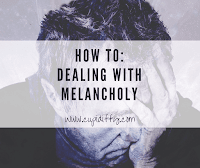How To: Dealing with Melancholy | Cupidiffy
Melancholy is a temperament synonymous to desolation, sadness and sorrow. It can easily be said to be a pensive sadness with no obvious reason, therefore differentiating melancholy from depression, which is a mental response to external stress inducing factors. Melancholy comes from inside and the causes are inherent. The causes are most biological, ranging from chemical imbalances in the brain, to genetics. It has also been associated with bipolar disorder 1 & 2.
A melancholic person is most likely to find difficulties reacting to pleasant events. He/She may also experience unusually obvious peak in depression, with no logical reason. You should also look out for occasional thoughts of suicide as it's also a symptom of melancholy.
A melancholic person is most likely to find difficulties reacting to pleasant events. He/She may also experience unusually obvious peak in depression, with no logical reason. You should also look out for occasional thoughts of suicide as it's also a symptom of melancholy.
Although, as mentioned earlier melancholy is mostly caused by biological factors, the social treatment is quite effective at containing it. Having an active social life gives a reasonable head-start for the containment and can help combat the adverse effects of melancholy. For the records, when I say "active social life", I don't me having an active presence on social media, as improper use of social media can induce/heighten depression, contrary to its purpose.
A good suggestion would be to find and belong to a social group, and pursuing your interests.
Actively belonging to a group of people who share your interests is a good boost. Example of such groups would be a book club, a hiking club or a sports club. Basically, merely feeling socially connected to your colleagues at work, friends and family members can do the trick, keeping your mind occupied with love and a sense of belonging. People who belong to very few social groups are more likely experience full-fledged melancholy. The sense of purpose, direction and meaning offered by the virtue of your social group is essential to your mental health and stability.
Pursuing your interests and learning new things for the sole purpose of self-development can also combat melancholy by instilling a mindset of positivity, and optimism. Learn to ride a bike, read a book you've always wanted to read. Set short-term goal and meet them. As your achievements pile up, you'll have no option but to love yourself seeing all you've been able to do all by yourself. Increasing your drive level.
How have you been able to combat melancholy? We'd love to hear your experiences in the comment section. They could help other readers. Thanks!



